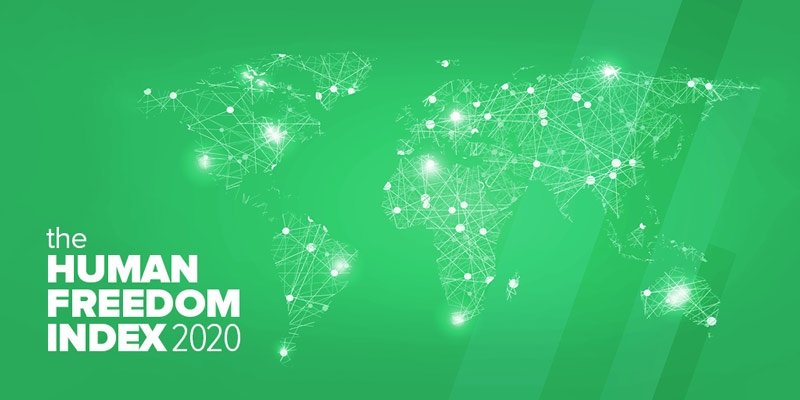The Human Freedom Index 2020

The Human Freedom Index is the most comprehensive freedom index so far created for a globally meaningful set of countries representing 94 percent of the world’s population. The HFI covers 162 countries for 2018, the most recent year for which sufficient data are available. The index ranks countries beginning in 2008, the earliest year for which a robust enough index could be produced.
On a scale of 0 to 10, where 10 represents more freedom, the average human freedom rating for 162 countries in 2018 was 6.93. Among countries included in this report, the level of freedom has scarcely improved (0.01) compared with 2017, with 87 countries increasing their ratings and 70 decreasing. Comparing all the countries for which we have the same data available since 2008, the level of global freedom has decreased slightly (−0.04), with 70 countries in the index increasing their ratings and 70 decreasing.
The jurisdictions that took the top 10 places, in order, were New Zealand, Switzerland, Hong Kong, Denmark, Australia, Canada, Ireland, Estonia, and Germany and Sweden (tied in 9th place). Selected countries rank as follows: Japan (11), the United Kingdom and the United States (tied in 17th place), Taiwan (19), South Korea (26), Chile (30), France (33), South Africa (68), Argentina (70), Mexico (86), Brazil (88), Kenya (93), India (111), Russia (115), Turkey (119), China (129), Saudi Arabia (151), Egypt (157), Iran (158), Venezuela (160), and Syria (162).
Out of 10 regions, the regions with the highest levels of freedom are North America (Canada and the United States), Western Europe, and East Asia. The lowest levels are in the Middle East and North Africa, sub-Saharan Africa, and South Asia. Women-specific freedoms, as measured by five indicators in the index, are strongest in North America, Western Europe, and East Asia and are least protected in the Middle East and North Africa, sub-Saharan Africa, and South Asia.
Countries in the top quartile of freedom enjoy a significantly higher average per capita income ($50,340) than those in other quartiles; the average per capita income in the least free quartile is $7,720.
The HFI also finds a strong relationship between human freedom and democracy. Hong Kong is an outlier in this regard. Although Hong Kong’s ratings and rankings have decreased since 2008, the impact of the Chinese Communist Party’s unprecedented interventions in the territory in 2019 and 2020 are not reflected in this year’s report (which, as noted, is based on 2018 data). Those recent events will likely decrease Hong Kong’s score noticeably in the future.
The findings in the HFI suggest that freedom plays an important role in human well-being, and they offer opportunities for further research into the complex ways in which freedom influences, and can be influenced by, political regimes, economic development, and the whole range of indicators of human well-being.

